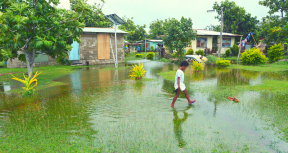Disasters caused by natural hazards increasingly threaten the lives and livelihoods of the world’s poor and cause billions of dollars in damages every year. Disadvantaged and vulnerable populations are most at risk as they typically reside in highly exposed areas, lose larger shares of their wealth to disasters, and have limited assets and access to social networks for coping and recovery.
Climate change is further exacerbating negative disaster impacts by contributing to more destructive and frequent droughts, floods, and storms. The poorest countries are bearing the brunt of disaster impacts. According to World Bank data, 82 percent of deaths since 1970 caused by natural hazards and extreme weather occurred in low- and lower-middle-income countries.
Disaster risk reduction (DRR) has strong economic and social benefits and is a critical aspect of climate change adaptation – which is a World Bank corporate priority.
This evaluation aims to surface lessons from the World Bank’s support for DRR, focusing on disasters caused by natural hazards. It was conducted to inform the World Bank as it scales up its support for climate change adaptation.
The evaluation covers disaster risks caused by floods, droughts, earthquakes, cyclones, volcanic disruptions, tsunamis, and landslides. The report assesses Bank support for risk identification; risk reduction activities such as resilient infrastructure, buildings, and protective works; the integration of DRR into institutions, policy, and planning; preparedness activities, including support for early warning systems; and disaster risk finance.
The evaluation does not cover elements of disaster response and recovery that do not have DRR activities. The evaluation does not cover the International Finance Corporation or the Multilateral Investment Guarantee Agency because DRR is not a major corporate priority for either organization.
The World Bank has agreed to the recommendations in the report.




